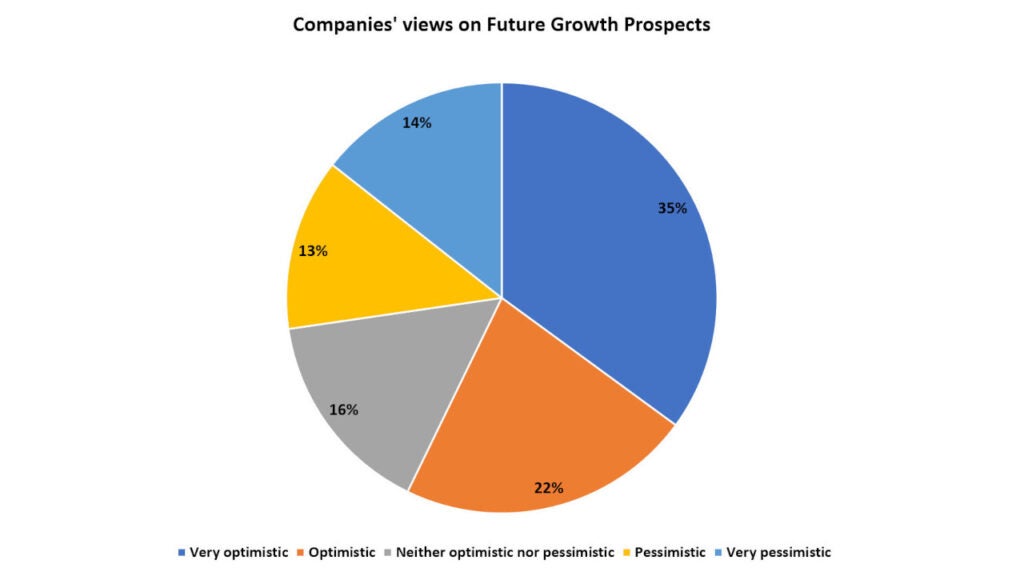
Business optimism increased in April 2022 compared to March 2022, according to an ongoing poll by Verdict, as COVID-19 travel restrictions were eased and demand in various sectors recovered.
Verdict has been conducting the poll to study the trends in business optimism during COVID-19 as reflected by the views of companies on their future growth prospects amid the pandemic.
Analysis of the poll responses recorded in March 2022 shows that optimism regarding future growth prospects increased by two percentage points to 57% in April 2022 from 55% in March 2022.
The respondents who were optimistic decreased by two percentage points to 22% in April from 24% in March, while those very optimistic increased to 35% in April from 31% in March.

The respondents who were pessimistic remained unchanged at 13%, whereas those who were very pessimistic decreased by two percentage points to 14% in April.
The percentage of respondents who were neutral (neither optimistic nor pessimistic) remained unchanged at 16%.
The analysis is based on 271 responses received from the readers of Verdict network sites between 01 April and 30 April 2022.
Increase in demand and relaxation of COVID restrictions boost optimism
Business confidence in the UK was stable at 33% in April, remaining above the historical average of 28% and significantly higher than the levels recorded during the first wave of the pandemic, shows the latest Lloyds Bank Business Barometer. Business confidence in the manufacturing sector showed marked improvement from 35% in March to 43% in April, followed by that in the retail sector which improved from 28% to 29%. Inflationary pressures, supply chain issues and the Russia-Ukraine crisis, however, continue to pose challenges for businesses.
The Canadian Federation of Independent Business’ Business Barometer® Short-term Index indicated that the small business confidence in the short-term increased marginally to 60.8, representing a monthly gain of 0.7 points. Quebec and Ontario registered the highest monthly gains of five points. Sector-wise, the hospitality sector showed the highest increase in short-term outlook with a gain of 16 points due to relaxation in restrictions. Inflationary pressures, supply chain issues and labour shortages continued to impact businesses in April.
Italy reported a marginal gain in business confidence from 105.3 to 105.5, according to the Istat Economic Sentiment Indicator of the Italian National Institute of Statistics. Manufacturing, construction and retail sectors reported improvement in business confidence. Business confidence in manufacturing remained stable at 110, while increasing from 160.1 to 160.6 in the construction sector and increasing from 100.3 to 103.4 in the retail sector.
Statistics Netherlands (CBS) reported an increase in producer confidence in the Netherlands from 8.7 in March to 10.8 in April. Manufacturers are positive about future growth prospects based on the orders and finished stock products. The electrotechnical and machinery industry reported the highest increase in confidence from 17 in March to 22.8 in April.
Business sentiment in Germany increased from 90.8 points in March to 91.8 points in April, as recorded by the ifo Business Climate Index of the Ifo Institute for Economic Research. Germany’s economy showed signs of resilience after the initial shock of the Russia-Ukraine crisis. Business climate improvements were registered in the services, transportation and logistics and hospitality industries.
The National Bank of Belgium reported an increase in business confidence in April due to an improvement in business climate. The production capacity utilisation rate reached 81.8% in April, which is higher than the long-term average and 78.5% recorded in January.
Business confidence in the US manufacturing sector remained positive as supply chain concerns eased and hiring increased, according to the S&P Global US Manufacturing Purchasing Managers’ Index™ (PMI™). The PMI increased from 58.8 in March to 59.2 in April, as operating conditions improved across the sector. Inflation and geopolitical tensions, however, posed challenges for the sector.



